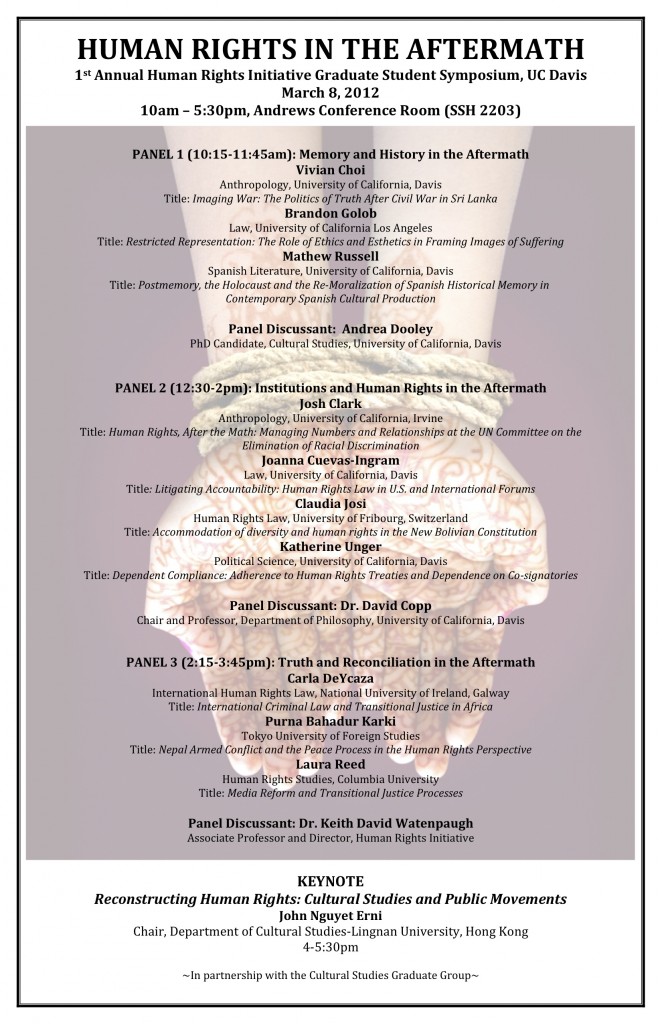Graduate Student Symposium – Human Rights in the Aftermath
Call For Papers:
University California Human Rights Initiative 1st Annual Graduate Student Symposium
UC Davis’ Human Rights Initiative, in partnership with the UC Davis Humanities Institute, is hosting an interdisciplinary graduate student symposium:
Human Rights in the Aftermath
University of California, Davis
Thursday March 8th 2012
For information see:
Keywords: human rights, reconciliation, justice, public policy, enforcement, reparations, conflict, commemoration
Human rights, as a universal principle, comes about in the aftermath of conflict. WWII brought us the Universal Declaration of Human Rights in 1948, as a reaction to the egregious abuse of human rights during that conflict. This post-conflict connection raises interesting questions about the way in which conflicts, particularly those where human rights abuses are present, have a direct impact on the scope, application, and understanding of those rights in the aftermath. Therefore, this symposium considers the positive and negative ways in which human rights evolve post-conflict.
In the context of this symposium conflict can be conceived of as a broad category including political conflicts, territorial and environmental claims, and issues of citizenship and national identity as they relate to human rights as well as traditional understandings of conflict, war and intervention. Human Rights in the Aftermath considers the myriad of ways in which conflict creates a “catastrophic complex” of political, legal, social, institutional, and cultural relations. Relevant questions include, but are not limited to: How does our understanding of the scope of human rights evolve in the face of changing extra-sovereign conflict? What institutions develop out of post-conflict applications of human rights? How effective are these institutions in terms of prosecuting perpetrators and enforcing human rights? How should perpetrators of human rights abuses be punished? What debates arise when victims violate human rights in the aftermath of conflict? What are the impacts of international criminal courts and truth and reconciliation commissions on the evolution and understanding of human rights? What impact do post-conflict discourses about human rights have on commemoration and reconciliation strategies? The idea here is that it is in the aftermath of human rights violations that the cultural norms and institutions surrounding the protection of human rights are impacted.
Thus, it is in focusing on the aftermath that we can get at such issues as reconciliation, responsibility, reparation, resolution, institutional roles and enforcement. As this symposium is intended to bring together human rights research and scholarship from a variety of fields, we invite graduate students from the diverse disciplines including History, English, Philosophy, Anthropology, Sociology, Law, Political Science, Environmental Justice, International Studies, American Studies, and Cultural Studies to submit abstracts.
The Human Rights in the Aftermath graduate symposium is part of a larger Human Rights and the Humanities Week sponsored by the Human Rights Initiative and the Davis Humanities Institute. Participants in the Human Rights in the Aftermath symposium are encouraged to attend the Contested Histories of Human Rights Colloquium on March 9, 2012. For a full schedule of activities for Human Rights and the Humanities Week please see the HRI website: http://humanrightsinitiative.ucdavis.edu/
To apply please submit an abstract (300 words maximum) by November 11. Please include your contact information. All abstracts must be emailed to: Katherine Unger kkunger@ucdavis.edu and/or Andrea Dooley adooley@ucdavis.edu Abstracts should be in a Word or PDF format as an attachment and included in the body of the email. Your email subject line should read: Human Rights in the Aftermath Abstract [last name]. Participants will be contacted by email December 9. Support for travel and lodging may be available. If funds become available participants will be contacted.
